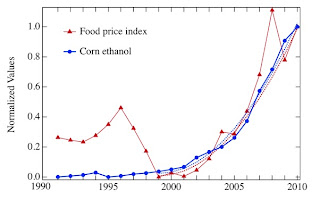Ever since I began my research of ethanol gas when it first appeared in Louisiana, I have been of the fervent belief that the premise for throwing $billions of taxpayer monies at ethanol was just another stupid political game. How can you reduce dependence on imported crude oil if you lose 8% gas mileage on the highway and 10-12% around town? You have to use MORE GAS so there is absolutely NO advantage, unless, of course you are a "tree hugger"!
Then, the other premise that it would reduce automobile exhaust emissions and less CO2 emissions to the atmosphere, resulting in cleaner air. That has been "debunked" by several major university studies. The added energy to produce a gallon of ethanol for exceeds the energy it creates. Then the major deforestation of forests to produce more and more acreage on which to grow corn takes away forests that absorb CO2 from the air! Plus the huge increase in emissions from more and more farm equipment to grow, harvest and transport corn to ethanol factories and move the ethanol from the factories to refineries (ethanol CANNOT be transported by pipelines like crude oil, gasoline and other products because ethanol is corrosive to the pipelines) to blend add considerably to emissions. Then, the ethanol plants themselves are huge consumers of water and also emit more emissions than are saved by the end product.
Then, we, the taxpayers who funded this ethanol experiment are paying twice....first to fund this experiment through subsidies for the ethanol industry ($6 billion/year until subsidies were ended 1/1/12), then by significantly increases in food prices, particularly all food products made from corn. Before the 2007 "Energy Security and Independence Act" that mandated billions of gallons of ethanol in gasoline, increasing annually, corn was selling for less than $2/bushel. It is now OVER $8.25/bushel and still going up.
The ethanol lobby groups argue that ethanol production does not increase the cost of food products. See the graph below which I copied from a research report on this issue last year. As you can see, the food price curve follows the corn ethanol graph almost perfectly. Draw your own conclusion..........
This HUGE government experiment must STOP!
Comments welcome...........send to way2gopete@yahoo.com
"Pete"
===============================================
Letter: Ethanol hasn't made fuel dent
Posted August
31, 2012 at 6:01 p.m.
W.S. (Bill)
Pryor, Knoxville
In April 2007 I
submitted a Citizen's Voice in which I expressed my concerns that ethanol from
corn would adversely affect many areas of our economy. These concerns were
mainly related to potential rises in corn prices because of ethanol demands and
the inevitable rise in costs to consumers of corn-based commodities. Joseph DiPietro, then University of
Tennessee vice president for agriculture, was prompt and detailed in his
rebuttal. His contention was that corn-based ethanol was merely one option in
alternate fuel production, supplemented by cellulose-based ethanol from
switchgrass, poplar trees and field residue after corn harvest. We are
currently hearing little of that prediction.
In the ensuing
five years, the vast majority of ethanol has been, and continues to be, corn
based. Corn prices have steadily risen and food prices have followed suit. In
addition, millions of taxpayer dollars have been thrown at anything containing
the word "ethanol." A demonstration ethanol distillery for
switchgrass use was built in East Tennessee, and there has been little reported
on the results of this showcase enterprise. Gasoline and food prices continue
their upward spiral (before hurricanes in the Gulf) with no abatement so long
as fossil fuels are not a welcome guest at the energy supply table.
I have no ax to
grind other than my displeasure each time I pay nearly $60 for a tank of
regular gasoline that should, in my estimation, cost $35. Take $100 in $5 bills
to pay for your next tank of gasoline and see how different it feels to leave
with $40. This feeling is muted by swiping a credit card and pulling out a
white receipt showing your cost. The obsession for alternate fuels development,
while fossil fuels lie unused, is a prolonging factor in this dilemma.

No comments:
Post a Comment